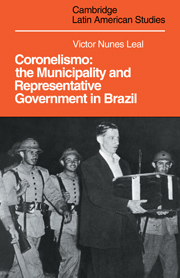Book contents
- Frontmatter
- Contents
- Editor's note
- Introduction by Alberto Venancio Filho
- A note on the term coronelismo
- 1 Notes on the structure and functioning of coronelismo
- 2 Powers of the municipalities
- 3 The elective principle in municipal administration
- 4 Municipal revenue
- 5 Organisation of the police and the judiciary
- 6 Electoral legislation
- 7 Conclusion
- Notes
- Bibliography
6 - Electoral legislation
Published online by Cambridge University Press: 05 October 2010
- Frontmatter
- Contents
- Editor's note
- Introduction by Alberto Venancio Filho
- A note on the term coronelismo
- 1 Notes on the structure and functioning of coronelismo
- 2 Powers of the municipalities
- 3 The elective principle in municipal administration
- 4 Municipal revenue
- 5 Organisation of the police and the judiciary
- 6 Electoral legislation
- 7 Conclusion
- Notes
- Bibliography
Summary
Electoral legislation until the end of the Empire
An examination of Brazilian electoral legislation is very important for the study of coronelismo. Some indications have already been given with reference to municipal elections, but they are not enough.
The first electoral decree of Dom João VI was that of 7 March 1821, which ordered that the election of deputies to the Portuguese Côrtes be governed by the relevant rules laid down in the Spanish Constitution. As the system was a complicated one – indirect suffrage in four stages – there quickly followed the circular of 23 March, authorising the captains-general and the governors of the captainships to make the necessary modifications. New instructions of 19 June 1822 regulated the election of deputies to our first Constituent Assembly in two stages, by means of indirect suffrage.
The same system, with a progressive computation from the first to the second stage, was welcomed in the draft to the Constitution, which was discussed and voted upon in that abortive congress and in the Constitution confirmed by Dom Pedro.
The first elections which took place for senators and deputies, were regulated by instructions handed down with the decree of 26 March 1824. In order to proceed with the elections of the first stage, electoral boards were set up, composed of the outside judge (or the ordinary one, or someone acting on their behalf), the parish priest, two secretaries and two examiners.
- Type
- Chapter
- Information
- CoronelismoThe Municipality and Representative Government in Brazil, pp. 118 - 135Publisher: Cambridge University PressPrint publication year: 1977



